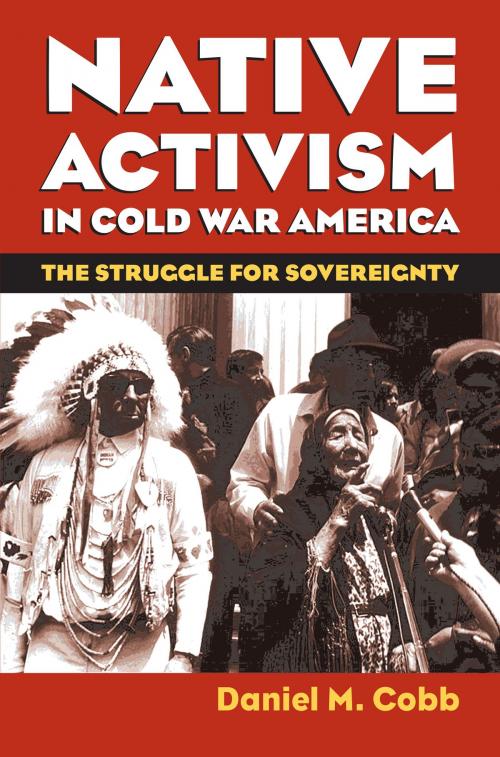Native Activism in Cold War America
The Struggle for Sovereignty
Nonfiction, Social & Cultural Studies, Social Science, Cultural Studies, Native American Studies, History, Americas, Native American, United States, 20th Century| Author: | Daniel M. Cobb | ISBN: | 9780700622405 |
| Publisher: | University Press of Kansas | Publication: | October 24, 2008 |
| Imprint: | University Press of Kansas | Language: | English |
| Author: | Daniel M. Cobb |
| ISBN: | 9780700622405 |
| Publisher: | University Press of Kansas |
| Publication: | October 24, 2008 |
| Imprint: | University Press of Kansas |
| Language: | English |
Labriola Center Book Award
The heyday of American Indian activism is generally seen as bracketed by the occupation of Alcatraz in 1969 and the Longest Walk in 1978; yet Native Americans had long struggled against federal policies that threatened to undermine tribal sovereignty and self-determination. This is the first book-length study of American Indian political activism during its seminal years, focusing on the movement's largely neglected early efforts before Alcatraz or Wounded Knee captured national attention.
Ranging from the end of World War II to the late 1960s, Daniel Cobb uncovers the groundwork laid by earlier activists. He draws on dozens of interviews with key players to relate untold stories of both seemingly well-known events such as the American Indian Chicago Conference and little-known ones such as Native participation in the Poor People's Campaign of 1968. Along the way, he introduces readers to a host of previously neglected but critically important activists: Mel Thom, Tillie Walker, Forrest Gerard, Dr. Jim Wilson, Martha Grass, and many others.
Cobb takes readers inside the early movement—from D'Arcy McNickle's founding of American Indian Development, Inc. and Vine Deloria Jr.'s tenure as executive director of the National Congress of American Indians to Clyde Warrior's leadership in the National Indian Youth Council—and describes how early activists forged connections between their struggle and anticolonialist movements in the developing world. He also describes how the War on Poverty's Community Action Programs transformed Indian Country by training bureaucrats and tribal leaders alike in new political skills and providing activists with the leverage they needed to advance the movement toward self-determination.
This book shows how Native people who never embraced militancy-and others who did-made vital contributions as activists well before the American Indian Movement burst onto the scene. By highlighting the role of early intellectuals and activists like Sol Tax, Nancy Lurie, Robert K. Thomas, Helen Peterson, and Robert V. Dumont, Cobb situates AIM's efforts within a much broader context and reveals how Native people translated the politics of Cold War civil rights into the language of tribal sovereignty.
Filled with fascinating portraits, Cobb's groundbreaking study expands our understanding of American Indian political activism and contributes significantly to scholarship on the War on Poverty, the 1960s, and postwar politics and social movements.
Labriola Center Book Award
The heyday of American Indian activism is generally seen as bracketed by the occupation of Alcatraz in 1969 and the Longest Walk in 1978; yet Native Americans had long struggled against federal policies that threatened to undermine tribal sovereignty and self-determination. This is the first book-length study of American Indian political activism during its seminal years, focusing on the movement's largely neglected early efforts before Alcatraz or Wounded Knee captured national attention.
Ranging from the end of World War II to the late 1960s, Daniel Cobb uncovers the groundwork laid by earlier activists. He draws on dozens of interviews with key players to relate untold stories of both seemingly well-known events such as the American Indian Chicago Conference and little-known ones such as Native participation in the Poor People's Campaign of 1968. Along the way, he introduces readers to a host of previously neglected but critically important activists: Mel Thom, Tillie Walker, Forrest Gerard, Dr. Jim Wilson, Martha Grass, and many others.
Cobb takes readers inside the early movement—from D'Arcy McNickle's founding of American Indian Development, Inc. and Vine Deloria Jr.'s tenure as executive director of the National Congress of American Indians to Clyde Warrior's leadership in the National Indian Youth Council—and describes how early activists forged connections between their struggle and anticolonialist movements in the developing world. He also describes how the War on Poverty's Community Action Programs transformed Indian Country by training bureaucrats and tribal leaders alike in new political skills and providing activists with the leverage they needed to advance the movement toward self-determination.
This book shows how Native people who never embraced militancy-and others who did-made vital contributions as activists well before the American Indian Movement burst onto the scene. By highlighting the role of early intellectuals and activists like Sol Tax, Nancy Lurie, Robert K. Thomas, Helen Peterson, and Robert V. Dumont, Cobb situates AIM's efforts within a much broader context and reveals how Native people translated the politics of Cold War civil rights into the language of tribal sovereignty.
Filled with fascinating portraits, Cobb's groundbreaking study expands our understanding of American Indian political activism and contributes significantly to scholarship on the War on Poverty, the 1960s, and postwar politics and social movements.















